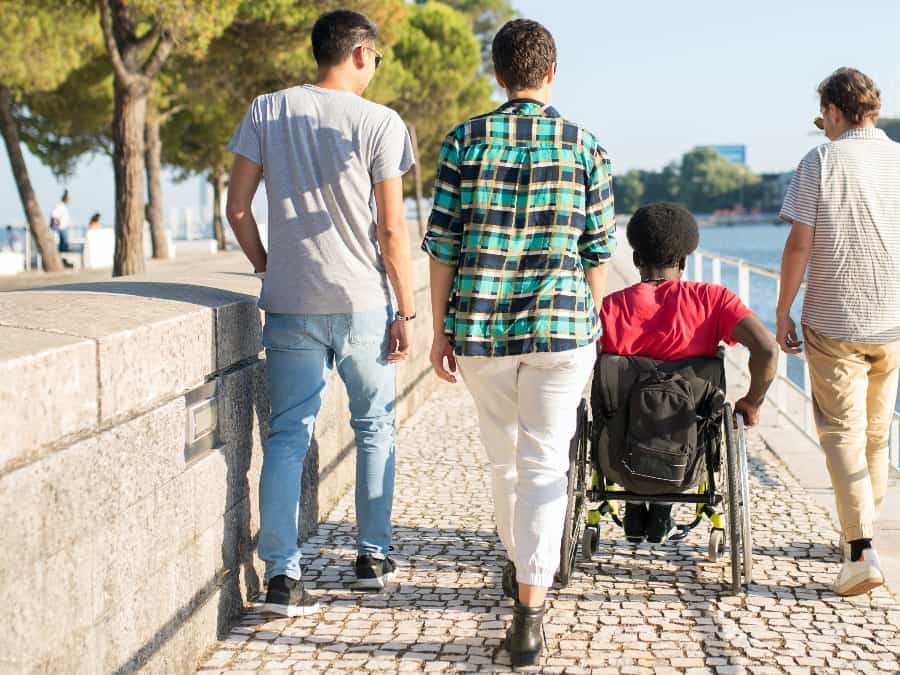New research has revealed that nearly half of families with someone who has accessibility requirements reported avoiding travelling abroad over the past year due to accessibility concerns across airports, airlines, and hotels.
The study, commissioned by Transreport, of people in the UK with an accessibility need themselves or within their family found that 64 percent said they may not travel abroad this summer. Two thirds fear that they will not go on a summer holiday abroad due to accessibility concerns.
The spending power of disabled households, referred to as “the purple pound”, is worth £274 billion annually, and the online spending power of disabled households is valued at £25 billion per year, while Transreport’s research suggests 42 percent of these people have not travelled abroad in the last year due to accessibility concerns.
It also revealed UK families take an average of 1.7 holidays per year at an average cost of £4,692. This puts a “staggering” projected loss to the global travel economy at over £45 billion a year from UK consumers due to inadequate accessibility, Transreport states.
The findings indicate a travel crisis impacting millions, with nearly half of disabled people opting to stay at home this summer, not because of choice, but because of accessibility concerns around air travel, transport links, and accommodation abroad.
Of those surveyed, 58 percent said the main reason for not going on holiday abroad this summer was because rooms with accessibility provisions remain too expensive, with around half of respondents stating that they cannot rely on transport links at their destination.
Data suggests this has led to an emotional strain on disabled people and their families when planning their summer holidays, with over half of respondents stating that travelling abroad is too stressful.
A key theme emerging from the data was the consensus that booking travel for people with accessibility requirements, from flights to transport to hotels, remains challenging. Over two thirds of respondents identified the booking process as a major barrier to their travel plans.
Additionally, 52 percent of respondents said that finding hotels with adequate accessibility provisions is a challenge when trying to book a holiday. This underlines the need for a single source of truth when it comes to accessibility information, to provide a more seamless booking experience, says Transreport.
In what could be perceived to be a crisis in the travel sector, disabled passengers and their families do not feel adequately supported, with 40 percent of those surveyed having avoided flying over the past year.
Over half agreed that airlines are not well equipped to support disabled passengers, while a further 58 percent agreed that international airports are not equipped to do so. Long delays at the airport remain a significant problem for people and/or families with accessibility requirements. 51 percent of survey respondents cited this as their main concern when travelling abroad.
This underscores the findings from Transreport’s recently published aviation whitepaper, which found that 48 percent of disabled passengers had to wait for over 30 minutes for assistance when disembarking from an aircraft, and almost one in five said they often wait for over an hour.
Jay Shen, CEO of Transreport, said: “These findings underline the real-world challenges people with access needs experience when travelling. As the summer holidays begin, we need to remember that these challenges begin for many before they even leave home. This includes additional planning and admin to ensure that assistance and accommodations are in place.
“At Transreport, our solutions directly address this, supporting over seven million accessible journeys and transforming the wider travel and hospitality sectors. However, action across the board is needed to drive lasting, meaningful change and ensure that everyone is able to travel safely and confidently no matter their destination.”
Concerns over finding adequate accommodation continue to limit travel plans for disabled people and their families, with 47 percent of respondents reporting that they have avoided staying in a hotel over the past 12 months due to accessibility concerns.
Over half of respondents said that finding accommodation with adequate accessibility is too difficult, and 54 percent do not believe that hotels are properly equipped.
Liz Williams, 51, from Brackley, uses a wheelchair and regularly encounters issues when trying to travel abroad: “Booking travel abroad for someone with accessibility issues can be extremely time consuming, and on many occasions, not worth it.
“There are airports and airlines that I actively avoid due to the poor treatment I have received in the past, including arriving early for check in and still boarding last, no aisle transfer wheelchair available, being told I could not board when all other passengers could due to adverse weather (not true as it turned out), being horrifically manhandled by special assistance, not following correct procedure, in front of a plane full of passengers which left me crying while being transferred into an airline seat.
“I was recently unable to attend a wedding in Cyprus with my partner as the accessibility access was not good enough. While there are some businesses that are finally taking accessibility seriously, there is still a long way to go until people with accessibility needs will be able to book travel abroad worry-free”.
Aviation Services UK has partnered with the BHTA and Sunrise Medical to create the Aviation Accessibility Panel (AAP), an expert group dedicated to improving the experience of airline passengers who use mobility aids.
The post Study reveals almost half of disabled people avoided travelling abroad due to accessibility concerns appeared first on AT Today – Assistive Technology.

